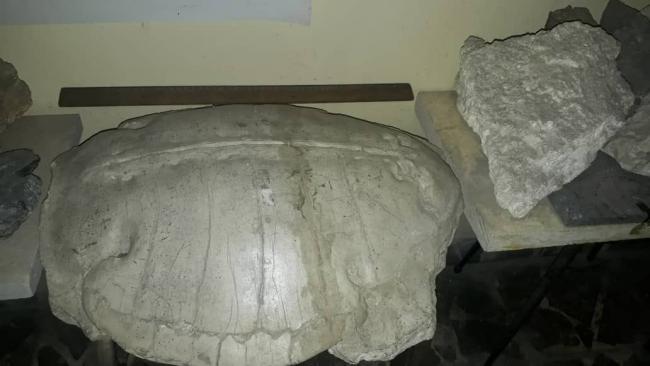A SYRIAN geologist who stumbled across a 13 million-year-old fossilised turtle will soon be rubbing shoulders with the UK’s brightest minerals experts.
Father-of-five Abdin Omar, 41, fled war-torn Aleppo as the bombs began falling. But the ancient fossil, found in a quarry 60km from Aleppo, has survived seven years of civil war cowering in a regional office of the ministry of petroleum where Abdin was once a manager.
This week, Abdin will travel to Durham University for one of the industry’s most prestigious calendar dates, the Extractive Industry Geology conference
He’s no stranger to international conferences, having been sent to events in Morocco and Turkey by his bosses.
But that was before a terrifying trip from bomb-torn Syria to relative safety in the UK in 2016.

The fossilised turtle
A geological surveyor since his days at Aleppo University, Abdin’s been out of the industry for around four years: “Even though rocks are rocks in every place, I’m less familiar with them in this country and how the companies here work. I want to use this as an opportunity to listen.”
Born to a farming family in Syria’s north west tip, Abdin embarked on a university geology course after missing out on a place to study engineering. He said: “When I started it was 1996. I said, what is it? It’s science. Chemistry, maths. It was very boring for the first year. When I passed to the second year everything was different.”
He joined the government’s geology department straight from college: “It was my first and only job.”
In Syria, Abdin was part of a team of geologists who stood up to international companies, telling politicians the Sakhaba Dam would never hold water. The underlying geology meant the multi-million pound project would always leak water into the semi-permeable rock.
But his most bizarre moment came when a quarry worker stumbled across an ancient fossil. “On one of my site visits, one of the quarry workers asked me, ‘Abdin, can you please look at this piece of rock,’” he said. “It was cracked in the middle.”
Clearly visible in the clay limestone was the outline of a turtle, roughly 40cm by 30cm and standing 20cm from the ground.
The turtle, found in March 2011, sparked the interest of an Aleppo newspaper together with Abdin’s palaeontologist friends.
Abdin said: “This was the first fossil of this type and size in Syria. It may lead to something to improve our understanding of the environment of the area 13 million years ago.
“We wanted to do further studies on the fossil, but unfortunately the war stopped everything.”
That conflict put a halt on Abdin’s career: “This kind of job, geology, is one of the first victims of the war.” After the civil war hit Syria in 2011, people were forced into a mad rush for survival. Abdin, wife Khulood and their five daughters joined the mass exodus that has seen around 5.6m people flee Syria.
He arrived in Swindon in 2015 and has been helped by the Harbour Project's Steps2Work scheme to find work, secure an A grade pass in his maths GCSE and join fellow geologists at this week’s conference. Abdin hopes to return to work as a geological surveyor.
Clive Mitchell, secretary of Extractive Industry Geology, which is hosting the conference, said the event was an opportunity for Abdin to become more familiar with the UK minerals industry.
He said Abdin would fit in: “Once a geologist, always a geologist. We never retire; you’re always surrounded by rock. We’ve got a bond with someone like Abdin. We know his thought process. We’ll welcome him with open arms.”
'We offer refugees a roadmap to success'
STEPS2WORK helps refugees in Swindon understand how Brits work, writes project coordinator BRONWYN YOUNG.
When people like Abdin arrive in the UK one of the biggest hurdles to employment are cultural issues.
For example, what exactly does ‘be on time’ mean in the UK work context? Ready at 9.50 to start work? In the door at ten o’clock? Any time between say 10am and noon give or take a bit as time is a flexible concept and it doesn’t really matter? There are cultures where all those interpretations are valid. How do you know what the correct answer is here in the UK if no-one tells you? Trial and error? A mistake could cost you a job.

Bronwyn Young
The Steps2Work programme focuses on practical advice and guidance for refugees to help them decode these cultural differences. Through one-on-one and group coaching and exercises, Steps2Work helps refugees become more familiar with UK culture, language and work practices. When they’re ready, the programme also offers masterclasses on the written and the unwritten rules of the UK workplace delivered by, Dr Val Kohler, a former senior company director and long-time champion of equality, diversity and inclusion in the workplace.
If you found someone lost and alone in the middle of the night you wouldn’t leave them there without at least some advice and maybe a map and a compass. Or better yet, you’d light up your satnav or the iPad and show them where they are and what obstacles they face. With Steps2Work, we’re helping refugees develop their own individual road maps, so they can find a job and contribute to their new home.
Visit: www.harbourproject.org.uk.





Comments: Our rules
We want our comments to be a lively and valuable part of our community - a place where readers can debate and engage with the most important local issues. The ability to comment on our stories is a privilege, not a right, however, and that privilege may be withdrawn if it is abused or misused.
Please report any comments that break our rules.
Read the rules hereLast Updated:
Report this comment Cancel